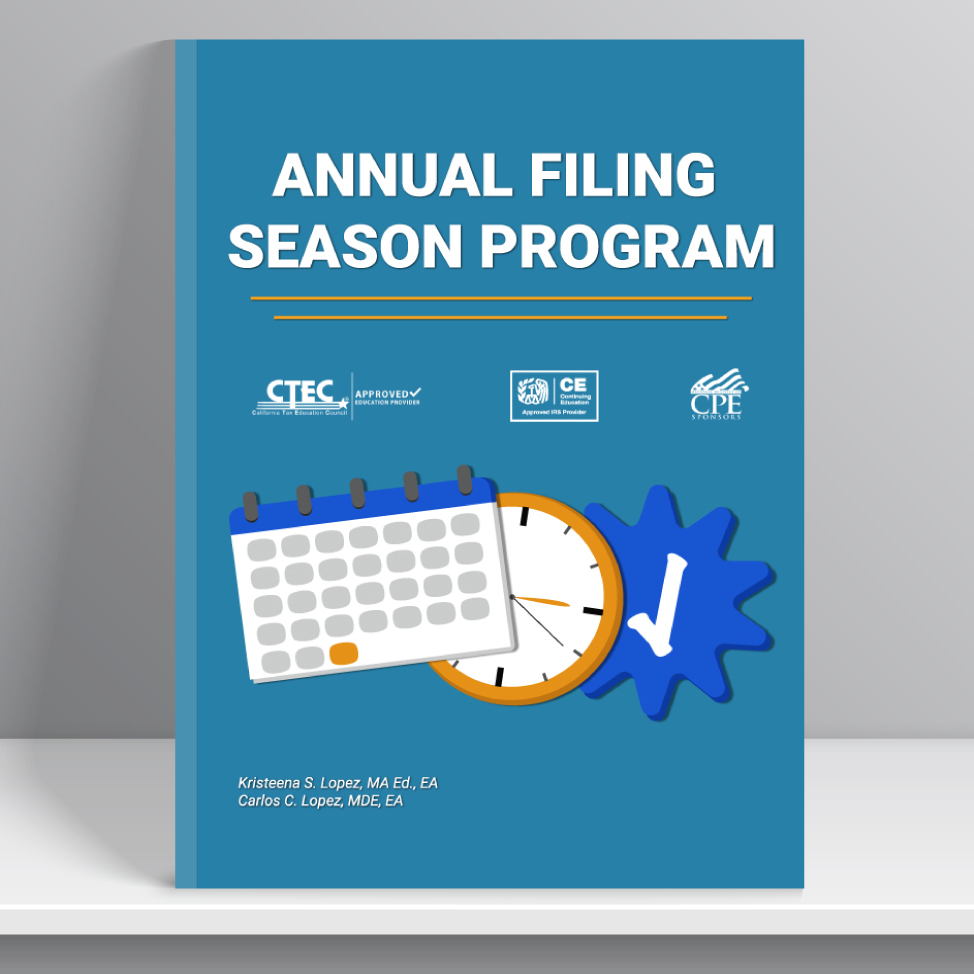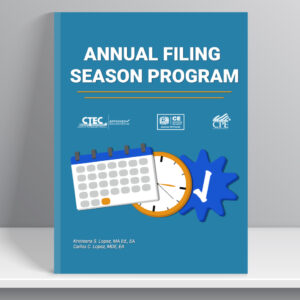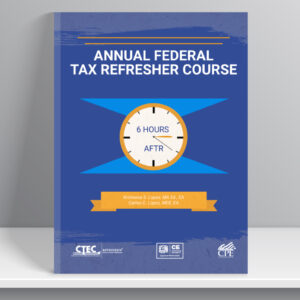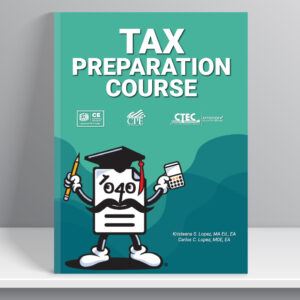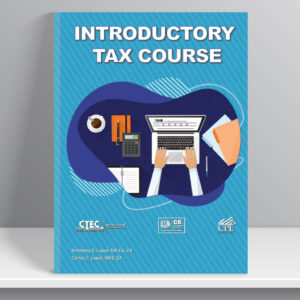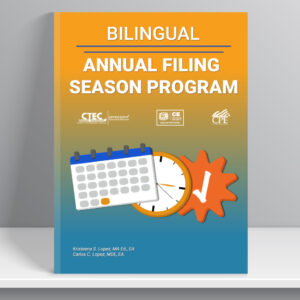Part I: Ethics Due Diligence and Penalties
This chapter will explain how to determine who qualifies as a tax return preparer, what representation rights a preparer has, how that individual is bound by the Circular 230 guidelines, and what it means for a tax preparer to behave ethically and responsibly.
Part 2: Federal Tax Law
Schedule C
This chapter encompasses how the sole proprietor reports income. Sole proprietorship is the most popular business structure. A sole proprietorship is indistinguishable from its owner, and all income earned is reported by the owner. Schedule C is the reporting tool for most sole proprietors. Covered in the course is line by line instruction to complete the Schedule C.
Schedule E
Rental income is any payment received for the use or occupation of real estate or personal property. The payment that is received is taxable to the taxpayer and is generally reported on Schedule E. Each Schedule E can report three properties. If the taxpayer has more than three properties, additional Schedule E’s would be used. Schedule E is not used to report personal income and expenses. The taxpayer should not use Schedule E to report renting personal property, that is not a business. To report other income, use Schedule 1, lines 8 – 24b.
Schedule F
Income received from the operation of a farm or from rental income from a farm is taxable. Farmers determine their taxable income from farming and related activities by using Schedule F. Profit or loss from farm income is first reported on Schedule F and then “flows” to Form 1040, Schedule 1, line 6. This course covers basic farm income and expenses.
Depreciation
Depreciation is an annual deduction that allows taxpayers to recover the cost or other basis of their business or investment property over a certain number of years. Depreciation is an allowance for the wear and tear, decline, or uselessness of a property and begins when a taxpayer places property in service for use in a trade or business. The property ceases to be depreciable when the taxpayer has fully recovered the property’s cost or other basis or when the property has been retired from service, whichever comes first. Depreciation is reported on Form 4562.
Part 3: Annual Federal Tax Refresher
The Annual Federal Tax Refresher (AFTR) course is intended to prepare the individual for the upcoming tax year. This course covers the latest tax law changes and current tax issues, as well as practice and professional responsibility. This course follows the 3 domains that are set annually by the IRS. They include:
- New Tax Law/Recent Updates
- General Review
- Practices, Procedures and Professional Responsibility
At the end of this section, the student will be able to do the following:
- Understand limited representation rights.
- Recognize the annual inflation rates for the standard deduction.
- Comprehend the difference between business vs hobby.
- Identify taxpayers who qualify for a federally declared disaster area.
How do I obtain an AFSP-Record of Completion?
- Take a six (6) hour Annual Federal Tax Refresher (AFTR) course that covers filing season issues and tax law updates, as well as a knowledge-based comprehension test administered at the end of the course by the CE Provider.
- Take ten (10) hours of other federal tax law topics; and
- Take two (2) hours of ethics.
- Have an active preparer tax identification number (PTIN).
- Consent to adhere to specific practice obligations outlined in subpart B and section 10.51 of Treasury Department Circular No. 230.
How and when will I get my Record of Completion?
- After PTIN renewal season begins in October, a Record of Completion will be generated to you once all requirements have been met, including renewal of your PTIN and consent to the Circular 230 obligations.
- If you have an online PTIN account, you will receive an email from TaxPro_PTIN@irs.gov with instructions on how to sign the Circular 230 consent and receive your certificate in your online secure mailbox.
- If you do not have an online PTIN account, you will receive a letter with instructions for completing the application process and obtaining your certificate.
Who is exempt from taking the AFSP course?
- Anyone who passed the RTRP test administered by the IRS between November 2011 and January 2013.
- Established state-based return preparer program participants with testing (Oregon, California, and Maryland).
- Those who have passed SEE (Special Enrollment Exam) Part 1 within the past 2 years.
- VITA/TCE volunteers: quality reviewers and instructors with active PTINs.
- Other accredited tax-focused credential holders such as the following:
- The Accreditation Council for Accountancy.
- Taxation’s Accredited Business Accountant/Advisor (ABA).
- Accredited Tax Preparer (ATP).
I meet one of these exemptions. How do I obtain an AFSP – Record of Completion?
- Take fifteen (15) hours of continuing education, including:
- three (3) hours of federal tax law updates,
- ten (10) hours of other federal tax law topics and
- two (2) hours of ethics.
- Have an active preparer tax identification number (PTIN).
- Consent to adhere to specific practice obligations outlined in Subpart B and section 10.51 of Treasury Department Circular No. 230 PDF.
| Course Details | Included in this course |
| Title: Annual Filing Season Program Level: Intermediate Delivery Method: Self-studyTo earn certificate of completion: • Pass final exams with 70% (or better) |
• 3-Part Chapters (eBook) • Videos • Due Diligence Final Exam • Federal Final Exam • AFTR Final Exam |

